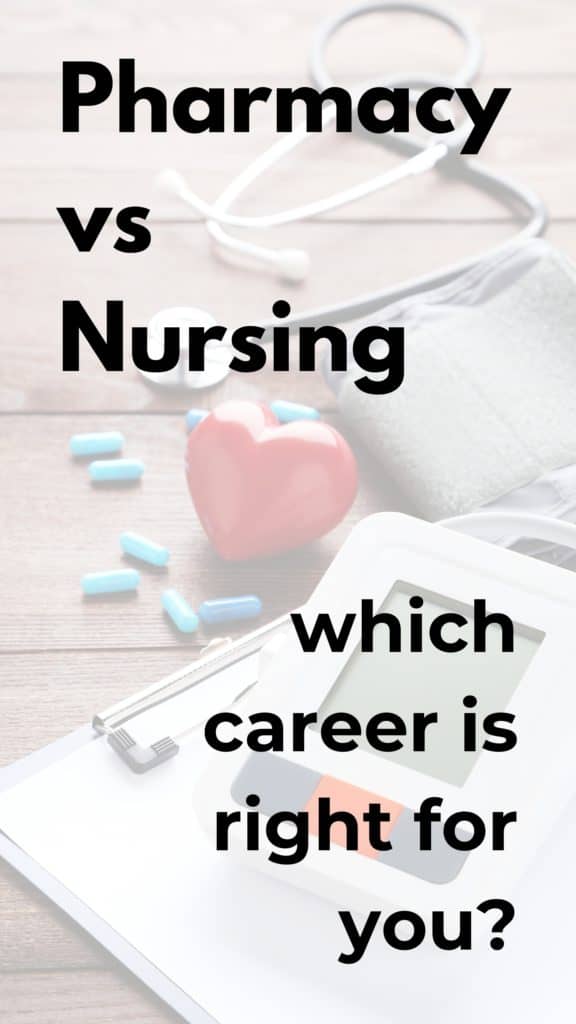Pharmacy vs Nursing: Which One Is Actually The Better Career For You?
Pharmacy vs Nursing? Which career field is right for you?
Both pharmacy and nursing healthcare professionals are high demand, lucrative careers. And both sound like great options, but you’re not sure which one is the right fit for you.

This post may contain affiliate links, which means I may receive a commission at no extra cost to you, if you make a purchase through a link. Please see our disclosure policy for more information.
It can be a tough decision to make. That’s why I’ve put together this helpful guide to help you choose the right career for you. With information on salaries, job prospects, and more, it’ll make your decision easier than ever before.
This post is for general informational and educational purposes only. You can read the full disclaimer for more information.
Pharmacist job description
A pharmacist is a healthcare professional who dispenses medication and provides advice on its proper use. In other words, they’re the experts on all things medication-related.
But beyond dispensing drugs, pharmacists also play an important role in patient safety. They’re often the last line of defense against dangerous drug interactions and they regularly counsel patients and provide education on medication side effects.
Pharmacists work closely with other members of the healthcare team to ensure that patients are receiving the best possible medication therapy.
They also conduct health and wellness screenings, provide immunizations, medication management of patients with chronic diseases, and much more.
Pharmacist work settings
Pharmacists can work in a variety of settings. Including a hospital pharmacy, nursing homes, retail pharmacy or drug stores, universities, and internet pharmaceutical companies. A different job description applies to each work environment.

Pharmacists that work in cancer treatment centers have duties that include developing and implementing policies for the safe handling of hazardous drugs. In addition to providing patient education on the safe use of chemotherapy agents.
A pharmacist that works within a research study has duties that include recruiting participants. And working with the research team to monitor participants’ progress and compliance with the study medication.
Nontraditional pharmacist jobs such as operating an online pharmacy may require you to have multiple state licenses. And includes tasks like filling orders, answering customer questions, and maintaining the website content.
No matter where they work or what their specific duties entail. All pharmacists have one goal in mind: to help their patients receive the best possible care.
Nursing job description
Generally, nurses utilize a systematic process to guide patient-centered care. The steps of the nursing process are assessment, diagnosis, planning, implementation, and evaluation.
And there are some basic duties that may be part of any job in the nursing field. For starters, nurses are responsible for patient care.
That means everything from taking vital signs to administering medications. But it also includes tasks like educating patients on their conditions and providing emotional support.
In addition to direct patient care, nurses also have other duties, like charting and documenting patient progress. And they may be responsible for supervising other members of the nursing staff.
Nurse work settings
As a nurse, you can work in a ton of different specialties. And with each of those roles comes a different job description.
Nurses that work in emergency rooms or intensive care units have duties that include stabilizing patients, starting IVs, and giving medications. Whereas nurses that work in labor and delivery have duties that include monitoring vital signs, assisting with vaginal deliveries, and providing postpartum care.
Pediatric nursing is another option. In this role, you’ll be responsible for providing care to children of all ages. Duties may include assessing and treating common childhood illnesses, administering immunizations, and providing education to families.
Nontraditional nursing jobs like legal nurse consultants include tasks such as reviewing medical records, preparing cases for trial, and testifying in court. While the duties of a nurse who works at a summer camp or on a cruise ship include administering medication, providing first aid, and health education.
As you can see, there’s a lot of variety in nursing job descriptions. And that’s just a small sampling of the different types of nurses out there. So whatever your interests are, there’s likely a nursing job that’s a perfect fit for you.
Which is harder pharmacy vs nursing?
Pharmacy educational requirements
In order to start a pharmacy career, students begin by getting their bachelor’s degree in a field such as biology or chemistry. You’ll need to take the Pharmacy College Admission Test (PCAT) in order to apply to pharmacy school.
Pharmacy students then go on to pursue a doctor of pharmacy degree, which can take up to four more years. Although, dual-degree pharmacy programs allow students to earn a bachelor’s degree and doctor of pharmacy degree simultaneously and typically take about six years to complete instead of eight.
After graduation, you’ll need to complete a formal internship/residency program, similar to medical school though in a pharmacy practice setting. Pharmacists must obtain licensure to practice, though the process and requirements can vary by state.
There are two exams for licensure: The North American Pharmacist Licensure Exam (NAPLEX) tests your health care safety and pharmacy skills, and the Multi-State Pharmacy Jurisprudence Exam (MPJE) tests your knowledge about pharmaceutical laws. Pharmacists who are hired to work in a hospital or other healthcare facility may need additional qualifications, depending on the job duties.
Nursing educational requirements
Nursing career paths have different educational requirements. An entrance exam such as the Test of Essential Academic Skills Exam (TEAS) is necessary for nursing program admittance.
The test required for a nursing student depends on the school you plan to attend. You can start your career in nursing as a licensed vocational nurse, licensed practical nurse lpn, or a diploma-prepared registered nurse rn. Both get you started in clinical practice and can be obtained in as little as 12 months.
Or you can obtain a two-year associate’s degree or a four-year bachelor’s degree to start working as a registered nurse. A master’s or doctoral degree is required for individuals who want to go on and work as nurse practitioners or advanced practice nurses.
A master’s degree may take up to two years to finish, whereas a doctoral degree can take three to five years. Nurse practitioners can specialize in areas such as family medicine and psychiatric/mental health.
Similar to pharmacists, nurses must obtain licensure to practice in their state. All nurses must pass the National Council Licensure Examination (NCLEX) before practicing as a registered nurse or pursuing education as say a family nurse practitioner.
Nurse practitioners take the American Association of Nurse Practitioners (AANP) or American Nurses Credentialing Center (ANCC) practice exams. They may need to obtain more specific certifications for their nursing specialization, such as an Oncology Nursing Certification or Dermatology Nursing Certification.
How much do pharmacists make?
The median annual wage for pharmacists was $128,570 in May 2021 according to the United States Bureau of Labor Statistics. The lowest earners made less than $76,840, and the highest earners more than $164,590.
The top industries for median wages were:
| Ambulatory healthcare services | $131,790 |
| Hospitals; state, local, and private | $130,280 |
| Food and beverage stores | $128,190 |
| Pharmacies and drug stores | $127,820 |
*Wages are up to date as of the BLS’s last update in Februrary 2023.
How much do nurses make?
The median annual wage for registered nurses was $77,600 in May 2021 according to the U.S. Bureau of Labor Statistics. The lowest earners made less than $59,450, and the highest earners more than $120,250.
The top industries for median wages were:
| Government | $85,970 |
| Hospitals; state, local, and private | $78,070 |
| Ambulatory healthcare services | $76,700 |
| Nursing and residential care facilities | $72,420 |
| Educational services; state, local, and private | $61,780 |
*Wages are up to date as of the BLS’s last update in September 2022.
The differences explained: pharmacy vs nursing
Differences in educational requirements
Both pharmacy and nursing are careers within the healthcare system. Though there are several key differences. Starting with education requirements, the length of time it takes to become a pharmacist is longer than that of a nurse.
There is an option to earn your nursing degree, become licensed, and start working within a one-year degree program. You can then decide to return to nursing school and further your education while making the wages of an entry-level nurse.
This option does not exist with pharmacy education. However you can take a pharmacy technician certification exam and work as a pharmacy technician while completing your education. But in order to begin practicing as a pharmacist all of your education must first be complete.
Both professions require a program entrance exam. After graduation pharmacists must pass two exams for licensure. Nursing professionals must pass one exam for licensure.
If you go on to pursue a career as a nurse practitioner or even a nurse anesthetist there is an additional exam for licensure.
Similarities and differences in job duties
There are differences in the job duties of pharmacists and nurses. Pharmacists’ primary responsibilities include filling and dispensing medications. Some pharmacists depending on their place of employment, do not interact with customers on a regular basis.
A community pharmacist who does interact with customers may provide medical advice or care, though not to the extent of a nurse. Pharmacists can offer guidance when buying at-home medical equipment, such as blood pressure or diabetes monitors. Pharmacists within community health centers may also provide customers with information on over-the-counter treatments in the event of a minor accident or illness.

Similar to pharmacists, nurses administer medications to patients. However, many nursing roles work directly with injured or ill patients. Nurses provide more complex medical care and treatment, as well as health monitoring.
Their tasks include using medical equipment to check vital signs and conduct diagnostic testing. They also analyze tests and collaborate with other health professionals to outline treatment options. Nurses may be required to provide medical treatment in an emergency to save a patient’s life or to treat patients to keep them safe from harm.
Nursing duties also vary based on whether you are a registered nurse or a more advanced nurse practitioner and your specialization.
Both pharmacists and nurses can spend a lot of time on their feet. Although in nursing it depends a lot on your specialty as an emergency room nurse may spend more time on their feet than a nurse case manager. Similarly, both professions may be required to work 24/7 when working within a hospital.
Differences in job growth and salaries
Job growth for nurses exceeds that of pharmacists, with the Bureau of Labor Statistics projecting a 6% growth (203,200 openings/year) for registered nurses from 2021-2031. In contrast, they project only 2% job growth (13,600 openings/year) for pharmacists over the same period.
Finally, there’s a significant difference in pay between a pharmacist and a nurse. The median salary of a pharmacist is $128,570 compared to the median salary of a nurse $77,600. Although if you have plans to go on and pursue a career as a nurse practitioner your salary would, in turn, increase.
The average salary between a pharmacist and nurse practitioner is more comparable: a pharmacist’s median salary of $128,570 vs the nurse practitioner’s median salary of $120,680.
Pharmacy vs Nursing which is right for you?
If you still need help deciding which career is right for you there are a few steps you can take:
-
Jot down all of your interest
-
Prioritize your goals i.e. what are your work-life balance goals
-
Take a personality or career test
-
Ask people already in the field
-
Shadow a professional
Pharmacy vs Nursing takeaways
In the end, it is important to choose a career that you are passionate about. Both career choices have their own unique benefits and will require some hard work. If you have an interest in both a nursing and pharmacy career path, consider taking the time to explore both.
Take advantage of shadowing opportunities with other medical professionals. Explore entry-level jobs in the field which include: a pharmacy assistant, pharmacy technicians, and medical or nursing assistants. Many of them hire high school graduates.
No matter which medical field you choose, both pharmacists and nurses make valuable contributions to people’s lives.













